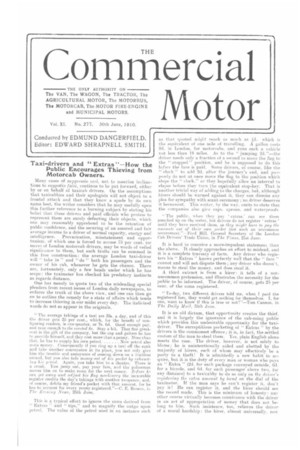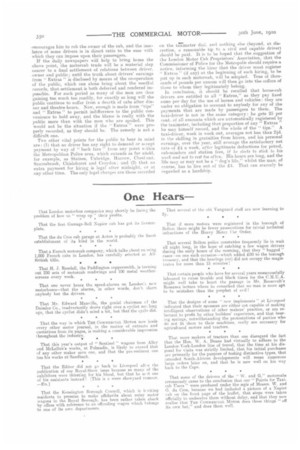Taxi-drivers and " Extras "—How the Public Encourages Thieving from Motorcab Owners.
Page 1

Page 2

If you've noticed an error in this article please click here to report it so we can fix it.
Many cases of suppressio veri, not to mention inclinations to suggestio falsi, continue to be put forward, either by or on behalf of taxicab drivers. On the assumptions that taxieabbies and their apologists will not object to a frontal attack and that they know a spade by its own name best, the writer considers that he may usefully open this further reference to a burning subject by stating his belief that these drivers and paid officials who profess to represent them are surely defeating their objects, which one may reasonably apprehend to be the retention of public confidence, and the securing of an assured and fair average income to.a a driver of normal capacity, energy and intelligence. Prevarication misstatement and upportunism, of which one is forced to accuse 75 per cent. (or more) of London motorcab drivers, may be words of veiled significance to them, but such faults can be summed in this free construction : the average London taxi-driver will take in " and "do " both his passengers and the owner or his cab, whenever he gets the chance. There are, fortunately, only a few heads under which he has scope : the taximeter has checked his predatory instincts as regards distance.
One has merely to quote two of the misleading special pleaders from recent issues of London daily newspapers, to enforce the truth of the above view, and one can then go on to outline the remedy for a state of affairs which tends to increase thieving in our midst every day. The italicized words do not so appear in the originals.
" The average takings of a taxi are 30s. a day, and of this the driver gets 25 per cent., which. for the benefit of nonfiguring readers, is one-quarter, or 7s. 6d. Good enough pay, and near enough to the coveted 8s. Stay a bit. That fine greatcoat is the gift of the company, hut the cap and gaiters be has to provide himself, and they cost more than a penny. More than that, he has to supply his own petrol Now petrol also costs money. Consequently if you ring up a taxi off the rank and take another conveyance in its place, you not. only give him the trouble and annoyance of coming down on a fruitless errand, but you also take money out of his pocket by exhaustiny h.is Truro,. Again, you take him to a theatre. There is a crush. You jump out, pay your fare, and the policeman moves him on to make room for the next corner. .71Pf ore lo can get away and adjust his flag machinery the inexorable register credits the day's takings with another twopence, and, of course, debits my friend's pocket. with that amount, for he has to account for every penny registered."—C. E. Benson, ie The Erening News, 25th June.
This is a typical effort to ignore the sums derived from " Extras " and " tips," and to magnify the outgo upon petrol. The value of the petrol uSed in an instance such as that quoted might reach as inneli as lid. which is the equivalent of one mile of travelling. A gallon costs 9d. in London, for motorcabs, and runs such a vehicle not less than 18 miles. As to the "jumping 2d."—the driver needs only a fraction of a second to move the flag to the " stopped " position, and he is supposed to do this before the fare is paid. Some drivers, of course, like the " clock " to add 2d. after the journey's end, and purposely do not at once move the flag to the position which stops the " clock," or they hopefully allow an interval to elapse before they turn the equivalent stop-key. That is. another trivial way of adding to the charges, but, although hirers should be warned against it, they can dismiss any plea for sympathy with scant. ceremony ; no driver deserves it hereanent. This writer, by the way. omits to state that. the companies also give caps. aprons. and waterproofs_ " The public, when they pay extras.' can see them punched up on the meter, but drivers do not register extras ' until they have received them, as they might have to pay the amounts out of their own pocket (not. such an uncommon occurrence).' —Fred Hill, General Secretary of the Londoir Cab Drivers"frade Union, in The TillteS., 21st. June.
It is hard to conceive a more-impudent statement than the above. It closely approaches an effort to mislead, and it is a complete travesty of facts. Any driver who registers his " Extras " knows perfectly well that the " fare " cannot and will not dispute them ; any driver who doesn't, means to steal the money, and does steal it.
A third extract is from a hirer : it tells of a notuncommon pretension, and illustrates the necessity for the public to be informed. The driver, of course, gets 25 per cent. of the sums registered.
" To-day, two different drivers told me, when T paid the registered fare, they would get nothing for themselves. I, forone, want to know if this is true or not ?"—Tom Cannon, in The. Daily Mail, 25th June.
It is an old dictum, that opportunity creates the thief, and it is largely the ignorance of the cab-using public which provides this undesirable opportunity for the taxidriver. The surreptitious pocketing of " Extras " by the drivers is the commonest offence; it is, in fact, the settled custom of the men to steal them. Yes, plain English alone meets the case. The driver, however, is not solely to. blame; he is unintentionally aided and abetted by tho majority of hirers, each of whom may effectively be a party to a theft: It is admittedly a new habit to acquire' but it is the duty of every nian or woman who pays an " Extra " (2d. for each package conveyed outside, 6d. for a bicycle, and 6d. for each passenger above two, for any distance) to a taxicabby to do so only on the driver's registering the extra amount by land on the dial of the taximeter. If the man says he can't register it, don't pay it ! He can register it, and the hirer should see the record made. This is the minimum of honesty : any other course virtually becomes connivance with the driver in an act of appropriation of money that does not belong to him. Such insistence, too, relieves the driver of a moral hardship: the hirer, almost universally. nnw ,encourages him to rob the owner of the cab, and the insolence of some drivers is in direct ratio to the ease with which they can impose upon their passengers.
If the daily newspapers will help to bring home the _above point, the motorcab trade will be a material ,step nearer to a final settlement of relations between driver, owner and public ; until the truth about drivers' earnings from " Extras " is disclosed by means of the co-operation of the public, which can alone bring about the needful records, that settlement is both deferred and rendered impossible. For such period as many of the men are .:htis gaining too much too readily, for exactly so long will the public continue to suffer from a dearth of cabs after dinner and theatre hours. Now, enough is made from "tips" and " Extras " to permit indifference to the public convenience to hold sway, and the blame is really with the .public more than with the men who are spoiled. This would not be the situation if the "Extras " were properly recorded, as they should be. The remedy is not a difficult one.
Two other vital points for the public to hear in mind are: (1) that no driver has any right to demand or accept payment by way of " back fare " from any point within the Metropolitan Police area, which extends as far afield, for example, as Staines, Uxbridge, Harrow, Chest tint, Snaresbrook, Chislehurst and Croydon ; and (2) that no extra payment for hiring is legal after midnight, or at any other time. The only legal charges are those reccrded on the trix meter dial, and nothing else (beyond, at discretion, a reasonable tip to a civil and capable driver) should be paid. It is to be hoped that the suggestion of the London Motor Cab Proprietors' Association, that the Commissioner of Police for the Metropolis should require a notice, informing the hirer that the driver must register " Extras" (if any) at the beginning of each hiring, to be put up in each motorcab, will be adopted. Tens of thousands of pounds per annum will then go into the coffers of those to whom they legitimately belong. In conclusion, it should be recalled that horse-cab drivers are entitled to all " Extras," as they pay fixed sums per day for the use of horses and vehicles: they are under no obligation to amount to anybody for any of the payments that are made by passengers to them_ The taxi-driver is not in the same category: he gets 25 per cent, of all amounts which are automatically registered by the taximeter, including that proportion of any " Extras" he may himself record, and the whole of the " tips." A taxi-driver, week in week out, averages not less than 24d. in the shilling in gratuities from hirers, and his personal earnings, over the year, still average the satisfactory net rate of £4 a week, after legitimate deductions for petrol, cab-minders and station fees, if he eferts to stick to his work and not to rest too of ten. His hours are long, and the life may or may not be a "doe's life," whilst the man, of course, has to live out of the £4. That can scarcely be regarded as a hardship.






















